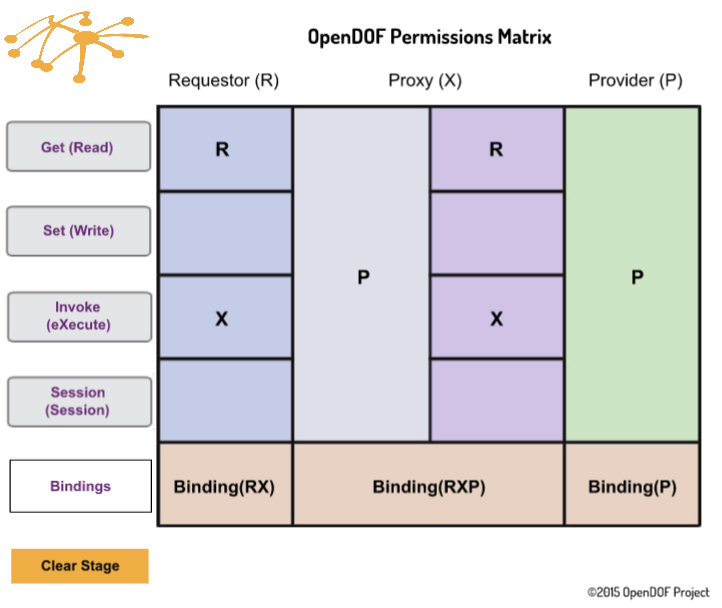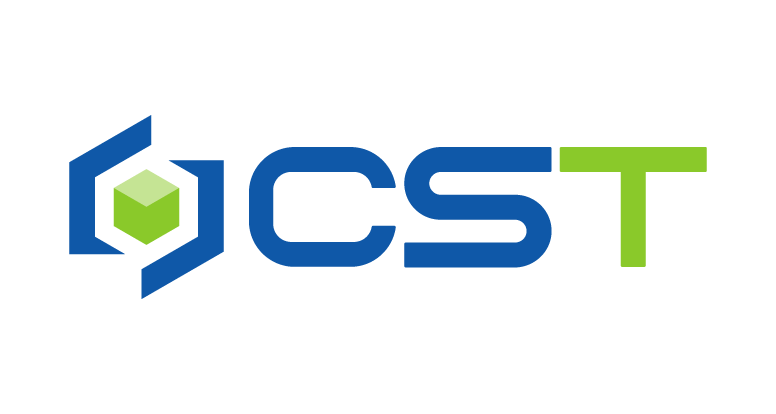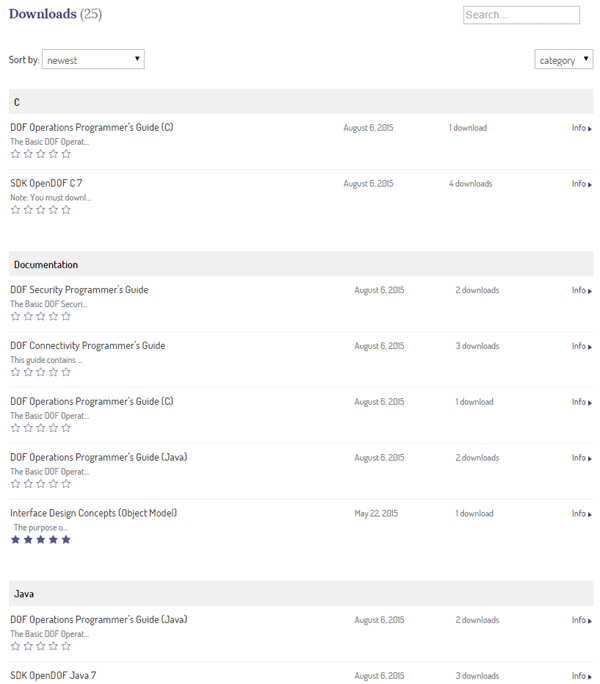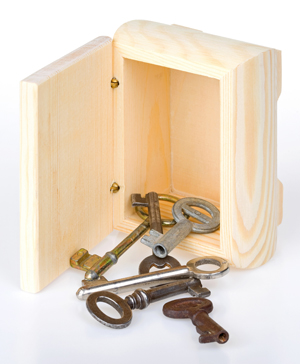OpenDOF Blog
Objects of InformationPermissions Matrix
The OpenDOF Permissions Matrix is a simple, interactive demonstration created to let you see how basic permissions work with DOF Technology.
The Matrix displays Operations and their corresponding binding: Get (Read), Set (Write), Invoke (eXecute) and Session (Session). By clicking on one of the four Operations buttons, you will see the binding displayed across a Requestor (R), Proxy (X) and Provider (P).
Along the bottom row, bindings are displayed for each object, in proper order (left to right).
Cloud Connectivity in Minutes
The OpenDOF Iot Router is an example of what can be done quickly using OpenDOF. The router itself is a one-click AMI that is available with a 30-day free trial and is meant for training and tutorials. Each instance provides a secure cloud “router” that will work with any of the OpenDOF Project libraries and tools.
Post on OpenDOF and Panasonic Cloud Service Toolkit
Here is a great post about the open IoT space mentioning both OpenDOF and the new Panasonic Cloud Service Toolkit, which is OpenDOF-compatible.
OpenDOF at the AllSeen Alliance Summit 2015
Panasonic sponsored and participated in the AllSeen Alliance Summit 2015 in Seattle. The booth focused on two projects, both of which relate to the OpenDOF Project. The first is the Panasonic Distributed Testing Framework, an open source project on GitHub, which the project uses for automated testing. The second is the Interface Repository Project, which is part of the OpenDOF Project itself. Bryant Eastham of Panasonic presented on the gateway connector and used the OpenDOF Project as an example – slides are available here. #AllSeenSummit @opendof
OpenDOF at IEEE STC 2015
During the IEEE Software Technology Conference 2015 the OpenDOF Project delivered a half-day tutorial on large-scale, secure data collection. This is a smaller conference attended by many government contracting groups. Tutorial slides are available here. This tutorial will be available online in the near future.
OpenDOF at Embedded Linux Europe 2015
Bryant Eastham of Panasonic presented at Embedded Linux Europe 2015 in Dublin. The slides are available here. The OpenDOF Project had a booth at the conference as well where we showed demonstrations and talked about the technology. The conference was attended by around 1,000 people. #lfelc @opendof
Asynchronous Operations
DOF Technology uses Synchronous and Asynchronous Operations, but we’ve found there’s a bit of confusion about what the differences are between these two types of operations and their sequences. On this page we’ll describe an Asynchronous Operation.
Synchronous Operations
DOF Technology uses Synchronous and Asynchronous Operations, but we’ve found there’s a bit of confusion about what the differences are between these two types of operations and their sequences. On this page we’ll describe a Synchronous Operation.
Introducing the Cloud Service Toolkit
Panasonic today announced the release of a cloud-based Internet of Things (IoT) toolkit, continuing the release of technology that began last March. This toolkit contains modular services that can be used to build highly scalable cloud-centric applications and is available either royalty-free for approved open-source projects or through licensing for commercial products. The CST…
OpenDOF Suitcase App for iOS and Android
The OpenDOF Project is pleased to announce that the OpenDOF Suitcase app is now available for both iOS and Android.
This application is frequently used in our demonstrations to show how a DOF application could be used to track the location of a suitcase and monitor any physical impacts it may receive in transit.
OpenDOF Data Transfer Libraries for C Released
The C Data Transfer Source Library provides an API to send data using the OpenDOF protocols to a Data Transfer Sink. This component provides the C libraries for developing applications for transferring arbitrary device/object data.
The New OpenDOF Download Manager
We have installed a new download manager that should make things much easier. As we prepare more releases, more training and more documentation (of all types), we wanted to put a system in place that would allow users to find the material they wanted, in one place.
OpenDOF Build Instructions for Java
The Java Object Access Library (OAL) provides a general API developers can use to write software that implements OpenDOF protocols.
OpenDOF Build Instructions for C
To use CMake to build the project, create a directory where the component will be built, and from that directory run the following commands. (Each component will need a different directory.)
Basic Concepts of OpenDOF Security
DOF Security and the Authentication Server (AS)
As part of DOF security, an Authentication Server (AS) is used to authenticate the credentials of each component on a network. The AS centralizes security information, creating a shared trust environment—without exposing credentials—while allowing full access control. This means you have control over who (or which resources) has access and what levels of access they have. A single AS can also provide multiple security domains.
The Panasonic Distributed Testing Framework
The Panasonic Distributed Testing Framework enables automated testing across multiple software versions and network topologies.
Testing functionality and interoperability between many versions of software components can be daunting. Since the number of tests grows exponentially with each version, the challenge of creating adequate test plans may even discourage modularized software development. The Panasonic Distributed Testing Framework helps solve this problem by automating the task of generating and executing tests in a scalable way.
The Interface Repository Project
The Interface Repository
Interoperability, which is critical to the success of the Internet of Things, is best accomplished through shared or “open” structures and definitions, particularly those describing the features and functionality of devices. For example, being able to consistently define what devices “are” and what they can “do” is a foundation for defining who or what is able to control them or access their data. Furthermore, an agreed-upon definition of a device’s capabilities makes mapping these definitions to different protocols more straightforward.
LinuxCon Japan 2015 Help — The OpenDOF “Suitcase” Demo
The OpenDOF “Suitcase” Demonstration shows how a DOF application could be used to track the location of a suitcase and monitor any physical impacts it may receive in transit.






